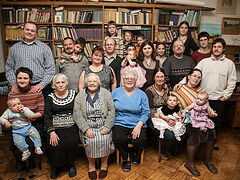July 8, the feast of Sts. Peter and Fevronia, is celebrated as the Day of Family, Love, and Fidelity in Russia. In this article, a chapter from the book Little Church, published by Sretensky Monastery in 2008, Archpriest Pavel Gumerov offers important advice on preserving family, love, and fidelity when difficulties arise.
Married life is unfortunately not a constant celebration of life, “a feast for the eyes and a flood of feelings.”1 Every family has its crisis periods, conflicts, and misunderstandings. But it’s important to remember that these are all temporary phenomena. We can survive these difficult moments only by mustering up patience and paying attention to one another.
We won’t consider situations when there’s nothing left between spouses and they’ve already firmly decided to get divorced. It’s difficult to advise anything then; there’s nothing left to do but pray for them. But usually both spouses are burdened by the situation they’re facing and want to reconcile, but they don’t know how to do it.
A disease is easier to prevent than to cure—this is well known. Irritation, anger, and reproaches need to be cut off as soon as they appear. Don’t wait for things to escalate too severely. As the Apostle James says: The tongue is a little member, and boasteth great things. Behold, how great a matter a little fire kindleth! And the tongue is a fire, a world of iniquity (Jas. 3:5-6). Sometimes after a stormy showdown, when you start to feel embarrassed for everything that was said in your hearts, you understand the conflict wasn’t worth a hill of beans. All of it could have been avoided by self-restraint and willpower.
I’ve heard confessions from people in prolonged family conflicts who claim they got married without love and now they’re suffering.
Of course there was love. I well remember these people in the early period, when they were affectionate and tender with one another. But they failed to preserve what they had, and all the good things were soon forgotten. The tree of love has to be watered daily. Such spouses need to understand their relationship very well, to calmly clarify what constitutes ideal family happiness for each of them, and utilizing all the good things that were, to start building anew. And love will definitely return if the spouses themselves want it. After all, we were commanded to love even our enemies.
So-called crises in a family happen for two reasons: 1) either the spouses couldn’t get used to each other 2) or they couldn’t preserve what they once had.
The first kind of crisis occurs, as a rule, in the first years of married life.
“To what can a family be likened? Imagine two rocks, hard and sharp. As long as they don’t touch each other, it seems everything is okay. They don’t affect one another. But put them in a bag and shake them up hard for a long time. One of two things will happen: Either the rocks get hewn down and no longer chip one another, or the sharp edges tear through the bag before they can be hewn down, and the rocks fly out. The bag is a family. Either the spouses get used to each other through small self-sacrifices, or they fly apart in anger at one another,” writes Fr. Ilya Shugaev in his book, Once in a Lifetime.
The second type of family crisis is connected with temporary and age-related changes. Either the spouses themselves or their life changes somehow, and they can’t always adjust and get used to these changes. That is, a new trial begins, and the spouses aren’t ready for it and can’t preserve the good things they had in their relationship. The life of a family suffers a change during crisis periods. For example, the children grow up and leave the nest. The spouses have to get used to this new situation, and sometimes get used to one another again and relearn to love one another. But as the ancient Latins said: “He who is warned is armed.” Those who are ready for difficulties can easily overcome them.
I’ve already mentioned that family conflicts mainly occur for two reasons: 1) because someone “hogs the blanket” and doesn’t want to start correcting himself, 2) or because of a reluctance to change anything. I’ll give you a third reason: the spouses inability to understand each other. For example, a wife complains that her husband has changed a lot, has stopped paying attention to her, that he comes home from work and sits in front of the TV. She wants care and affection and it seems to her they have completely different ideas about family.
Here’s what the psychologist A. V. Kurpatov says:
You say that you and your husband have different ideas about family. But do you know what his ideas are? You need to find out how your husband sees his ideal family. Ideal—that is, not with you, but in general. What should it look like? Lead him to a friendly and sincere conversation about it, and explore. It’s quite possible that his ideas about the ideal family aren’t that different from yours. But what do you think—does he know how you see the ideal family? It’s doubtful. He probably doesn’t know. And when you get to a point of openness, it would make sense to tell him.
Only if you and your husband can find common ground in your ideal (hypothetical) family models is there a chance to restore normal, harmonious relations. I’ll warn you right away: Looking for these “points of contact” should take place without accusations, threats, blackmail, insults, harsh statements, and sweating the small stuff. Amidst the dirt and chaff, you have to find the wheat—healthy grains that can sprout. You can take the best from the past and look optimistically into the future, and you can and must support each other—and then this reconstruction will bring you benefit: You’ll restore your marriage and you won’t lose yourself.2
We often expect something from someone and get very angry when they don’t know about it, but we’re afraid to tell them. It remains to add that a frank conversation should be very heartfelt and calm. In no case should we start anything in an irritated state—things will only get worse!
No one will debate that irritability, anger, and despondency really interfere with a marriage and that you need to try to change your own character for the better first of all for yourself. A man who refuses to change anything about himself risks ending up alone. The sins we commit are first of all directed against ourselves.
It happens that spouses hurt each other badly, so that it can be very difficult to forgive. I’ve heard the advice that if you simply can’t forgive someone, imagine you’re burying them and have to go to the coffin to give them the last kiss. A woman came to me one day complaining about her husband who had greatly offended her. She said she was even ready to divorce him. Two days later, he died in the prime of his life from a heart attack, and his wife’s grief knew no bounds.
Now let’s talk a little bit about the types of personalities. Everyone knows them: choleric, sanguine, phlegmatic, and melancholic. It’s not uncommon for people of completely different temperaments to come together in marriage. It’s not bad—they can complement each other. But it can also be the cause of misunderstanding. It’s very important for loving spouses to figure out what type of character they have.
A husband with an emotional, hot-tempered character can get irritated when his phlegmatic wife reacts calmly to his worries. But in the depths of her soul, she may be experiencing and feeling everything much deeper and stronger. You just have to be able to read the signs she’s giving. Of course, this doesn’t come right away.
You often see how busy wives, irritated by the silent calmness of their husbands, fixate on some little thing and endlessly “nag” them. Once I saw a souvenir: a small saw stuck in a log that said: “Saw, but know when to stop.”3 When we’re stuck on some trifling matter and we can’t stop, we’re making a mountain out of a molehill.
No one can advise how to influence loved ones. Even psychotherapists only help “change our own emotional reactions to this or that event.”4 You can’t remake a person’s psyche. If you change yourself, you’ll see that your spouse comes to meet you halfway.





